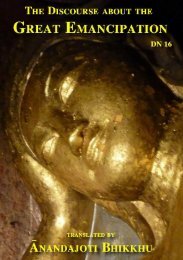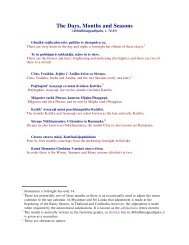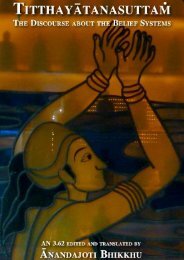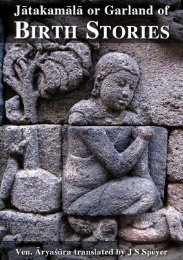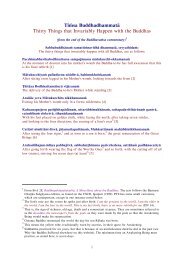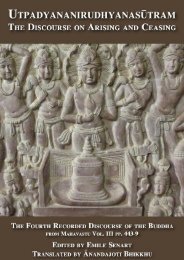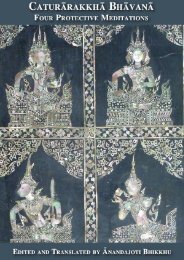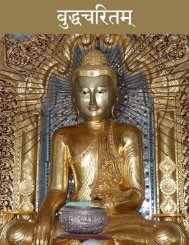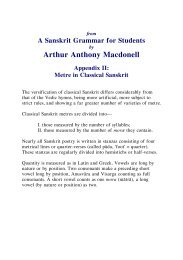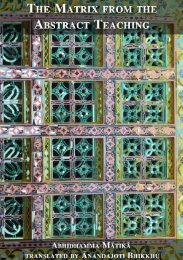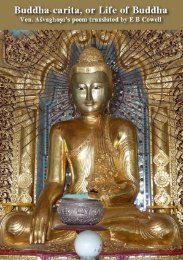BhikkhunÄ«saá¹yutta Thematic Discourses about Nuns - Ancient ...
BhikkhunÄ«saá¹yutta Thematic Discourses about Nuns - Ancient ...
BhikkhunÄ«saá¹yutta Thematic Discourses about Nuns - Ancient ...
Create successful ePaper yourself
Turn your PDF publications into a flip-book with our unique Google optimized e-Paper software.
The <strong>Thematic</strong> <strong>Discourses</strong> <strong>about</strong> <strong>Nuns</strong> - 19<br />
upasaṅkamitvā Cālaṁ bhikkhuniṁ etad-avoca:<br />
and after approaching he said this to the nun Cālā:<br />
“Kiṁ nu tvaṁ, bhikkhuni, na rocesī?” ti<br />
“With what, nun, are you not pleased?”<br />
“Jātiṁ khvāhaṁ, āvuso, na rocemī.” ti<br />
“I am not pleased, friend, with birth.”<br />
“Kiṁ nu jātiṁ na rocesi? Jāto kāmāni bhuñjati,<br />
“Why is it you’re not pleased with birth? Being born one enjoys pleasures,<br />
Ko nu taṁ idam-ādapayi: ’Jātiṁ mā roca, bhikkhunī’?” ti<br />
Just who made you agree to this: 35 ’Do not be pleased with birth, nun’?”<br />
“Jātassa maraṇaṁ hoti, jāto dukkhāni phussati,<br />
“For one who is born there is death, being born one feels suffering,<br />
Bandhaṁ vadhaṁ pariklesaṁ, tasmā jātiṁ na rocaye.<br />
(There is) bondage, murder, hardship, 36 therefore I am not pleased with birth.<br />
Buddho Dhammam-adesesi, jātiyā samatikkamaṁ,<br />
The Awakened One taught the Dhamma, the transcendence of birth (and death),<br />
Sabbadukkhappahānāya, so maṁ Sacce nivesayi.<br />
For giving up of all suffering, he has established me in the Truth. 37<br />
Ye ca rūpūpagā sattā, ye ca arūpaṭhāyino,<br />
(There are) those beings attached to form, those (attached to) formless states,<br />
Nirodhaṁ appajānantā, āgantāro punabbhavan.”-ti<br />
(And) those who know not cessation, 38 they (all) come to rebirth again.”<br />
35 Comm: ko nu taṁ idamādapayī ti ko nu mandabuddhi bālo taṁ evaṁ gāhāpesi? just who<br />
made you agree to this means which fool of dull intellect made you seize on this?<br />
36 Comm: pariklesan-ti aññam-pi nānappakāraṁ upaddavaṁ. Idāni yaṁ Māro āha: “Ko nu<br />
taṁ idam-ādapayī?” ti Taṁ maddantī: “Na maṁ andhabālo ādapesi, loke pana aggapuggalo<br />
Satthā dhammaṁ desesī” ti dassetuṁ. Buddho ti-ādim-āha; hardship means manifold<br />
calamities. Now this is what Māra said: “Just who made you agree to this?” To show how<br />
she rejects that: “No blind fool made me agree, but the greatest man in the world, the<br />
Teacher who taught the Dhamma.” (So) The Awakened One and so on is said.<br />
37 Comm: tattha Sacce nivesayī ti paramatthasacce nibbāne nivesesi; herein, he has established<br />
(me) in the Truth means he has established (me) in the highest truth, in Emancipation.<br />
38 Comm: nirodhaṁ appajānantā ti nirodhasaccaṁ ajānantā; those know not cessation means<br />
those who do not know the truth of cessation.



